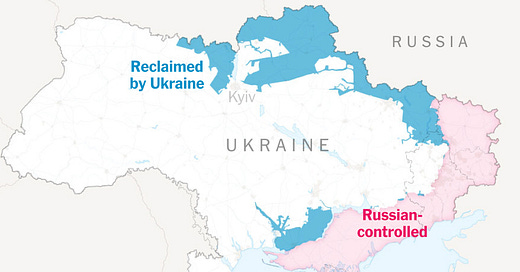Who Are the Smartest People in the World On Foreign Policy?
Will the geopolitical experts please stand up.
In 1915, U.S. President Woodrow Wilson had a choice. To go to war against Germany or to remain neutral. Wilson needed the support of Congress—who was also not eager to go to war—but after the sinking of the passenger ship, the Lusitania, that became more likely. But even with the media’s outrage over the loss of American civilian life, Wilson stood for isolationism. It wasn’t until 1917, when Germany had tried to recruit Mexico to sabotage America in exchange for old territory back, that enough was enough and the U.S. entered the war. (See the Zimmerman Telegram.) World War 1 is widely considered to be an unnecessary and tragic war. Where political leaders led young men to be slaughtered for minimal gains.
Today, the question for President Biden is the degree of support the US should give to Ukraine in their ongoing war with Russia. Hopefully his first objective is what steps need to be taken to avoid nuclear war. Yet, does more aid and support for Ukraine make that more or less likely is not a simple question to answer.
The real question I want to explore is, who does Biden and other foreign policy makers go to for advice and wisdom in a time like this? Practically, it's the people closest to the leaders. These people range from official to unofficial, and either appointed or elected. Do these people have the qualifications and abilities to be good information-processors and decision-makers? Maybe.
The current Americans serving as Secretary of Defense and National Security Advisor are Lloyd J. Austin III and Jake Sullivan. Austin’s most relevant experience is:
And for Sullivan:
For every individual, the correlation between experience and knowledge is tenuous and highly variable. A common critique that has plagued government since its inception is choosing someone for loyalty reasons over merit.
Besides this concern, there’s the broader concern of what makes anyone an expert at foreign policy. Foreign policy is not a science like biology, chemistry, or physics where you can plug in data or numbers into an equation and get back a precise answer. Because we’re dealing with people there’s complexity, randomness, and tail-risk built into the already complex nature of a country's foreign and domestic politics.
There is not one specific type of person to go to for international relations advice like historians, military strategists, politicians. Titles and experience are mere starting points. It’s better to evaluate people individually and holistically. Direct experience, having made accurate predictions in the past, and open-minded deep thinkers, are three key criteria. Fourth, and possibly equally as important, is integrity.
This combination of traits will mean the person will have specific domain knowledge about the current foreign policy situation from experience. They’ve put their reputation on the line through predictions or past performance. And has the mental acuity to combine all this information with changing circumstances and is offering advice to help the country more so than for personal gain.
Sometimes bringing in a non-specialist can offer insights that those too close to the situation will miss. On the other hand, there can be too many voices in the room. Yet, if ever intellectual diversity mattered, it is in the realm of foreign policy. The military leaders persuading President Lyndon B. Johnson to escalate the war in Vietnam were the exact opposite of diverse thinkers.
It’s incredibly difficult to make foreign policy predictions and other variable predictions like those over close elections. But Philip Tetlock has shown that there are superforecasters who are statistically better than average about making predictions. And better than many experts. Superforecasters and prediction markets help to give people “skin in the game”, when it comes to making predictions. Too often, opinion writers and outlets with sterling reputations offer misleading claims and opinions with no reputational consequences. (Humility is in short supply here too.) In foreign policy there is a relationship between ideologically biased status quo claims that either come from the military industrial complex or feed it. Expertise, when there is billions of dollars at stake, can be hard to distinguish.
Open minded and deep thinkers are a rare breed. And close-minded shallow thinkers can appear the opposite, at least for a time. Being in a highly successful position in terms of income or status, does not correlate neatly with open mindedness and depth of thought. Some of the smartest foreign policy people may lack the ambition or temperament for climbing hierarchies. The internet has broadened access to foreign policy experts. It can be hard to distinguish the good ideas from the ideas that are simply more popular. Overall, there’s a diversity of opinions but it can be hard to find the better ones. Especially from the same person consistently. And how the ecosystem of ideas interacts or reaches people in power is a complex, but important question.
The United States is a democratic republic. And the check on bad foreign policy is federal elections. But this implies an engaged and informed public. And the public distinguishing which of the elites are well-trained and virtuous in their service is hard to glean. And even among the politically engaged, it’s hardly a priority.
It is unlikely there will be any foreign policy revolution or golden-age anytime soon. But small steps from the top-down and bottom-up to better understand and amplify the better geopolitical thinkers is needed. War can bring out the best and the worst of humanity. It is these periods of great change that offer opportunities to learn and get better, or stagnate. Or worse.



